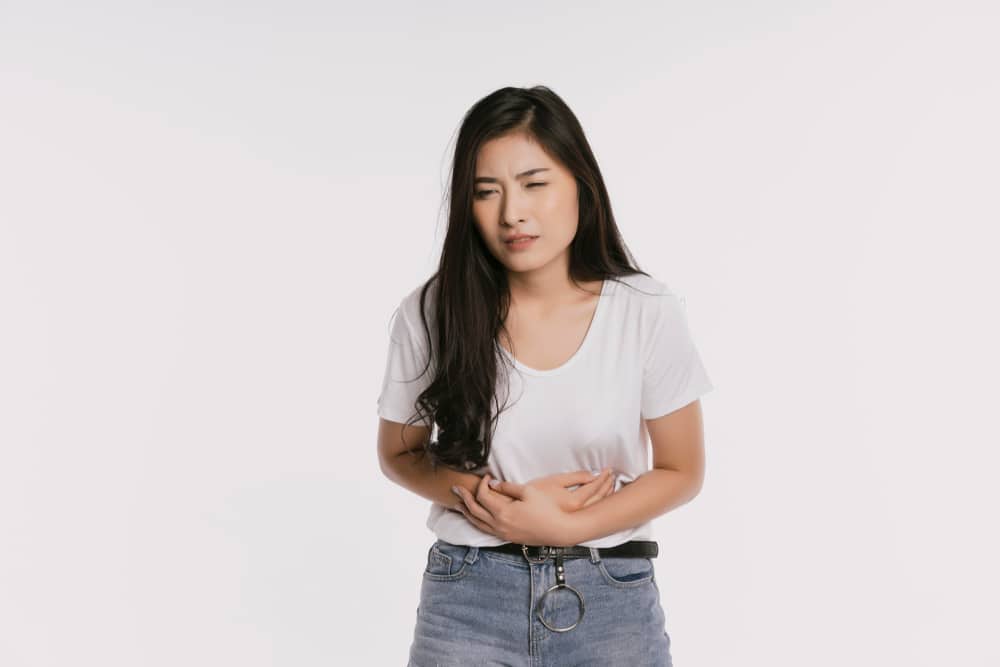Coffee is a beloved beverage that millions of people rely on to kickstart their day. But for some, that morning cup can come with an unpleasant side effect: bloating. If you’ve ever experienced discomfort after drinking coffee, you may wonder, Does coffee make you bloated? The answer is yes: coffee can cause bloating, and this happens for a variety of reasons related to digestion, individual sensitivity, and how coffee interacts with your gut health. In this article, we’ll explore the causes of bloating from coffee, the symptoms, and how to avoid it while still enjoying your favorite brew.
What is Bloating?
Bloating refers to the feeling of an enlarged or swollen abdomen, often accompanied by discomfort or even pain. It can result from the accumulation of gas in the digestive system or from water retention. Bloating may also be linked to food intolerances, digestive disorders, or consumption of certain beverages, including coffee.
Understanding Bloating from Coffee
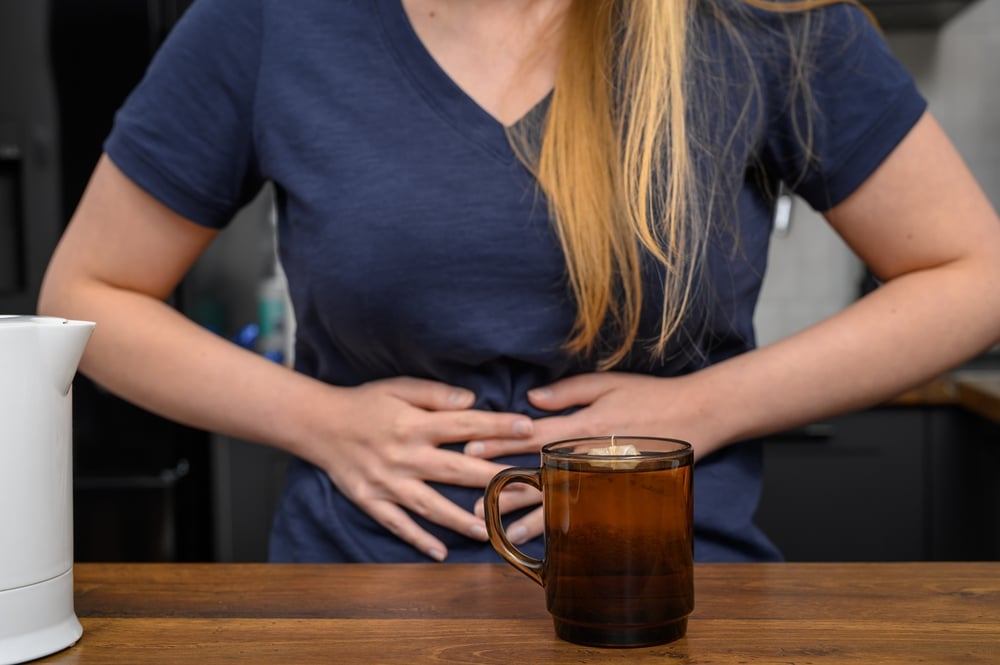
Bloating from coffee occurs when your digestive system reacts to certain components in coffee or how it’s consumed, leading to a buildup of gas in the digestive tract. The sensation of bloating often feels like your stomach is stretched or swollen, causing discomfort and sometimes pain. Many people may also feel gassy after drinking coffee, prompting the question, can drinking coffee give you gas? The answer is yes; coffee can trigger gas formation in the digestive system.
Causes of Bloating from Coffee
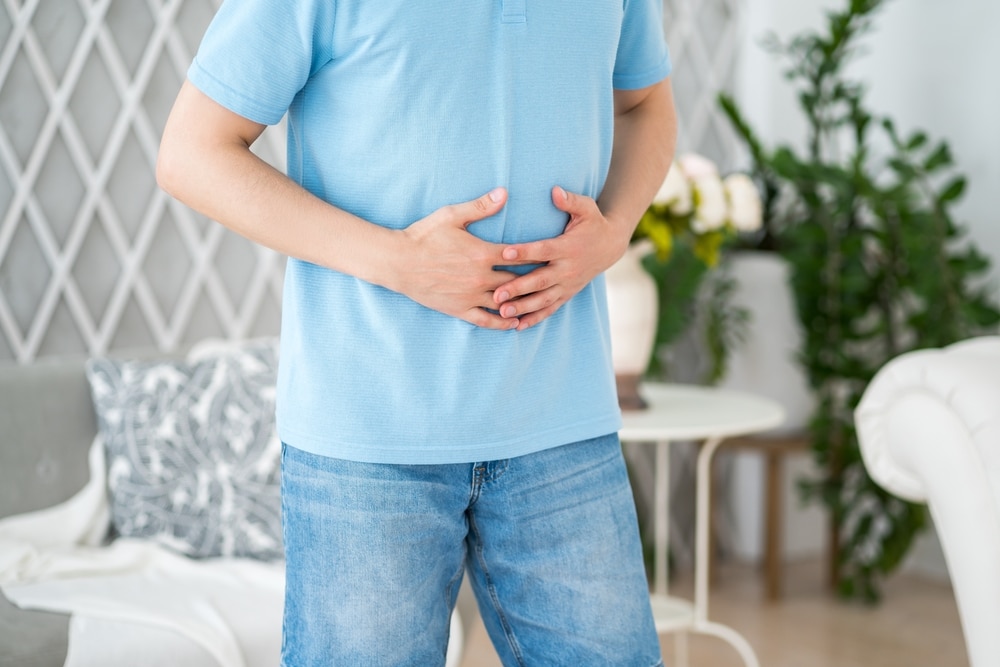
Acidity of Coffee
Coffee is naturally acidic, with a pH ranging from 4.85 to 5.10. This acidity can irritate the stomach lining, particularly for those with sensitive stomachs or conditions like acid reflux or gastritis. When the stomach lining is irritated, it may produce excess acid, leading to indigestion and bloating.
Caffeine Sensitivity
If you are sensitive to caffeine, your body may react more intensely to a cup of coffee. Caffeine stimulates the digestive system, increasing gastric acid production, which can lead to stomach discomfort and bloating from coffee. If you’re asking yourself if caffeine makes you bloated, this might be the reason.
Gut Health
While having health benefits like improved concentration and weight loss, coffee can also affect your gut health. Caffeine can stimulate the production of stomach acids, which may upset the balance of your gut bacteria. A disrupted balance can lead to bloating and gas as these bacteria are vital in the breakdown of food in your digestive tract.
Lactose Intolerance
Many people add milk or cream to their coffee, but if you are lactose intolerant, dairy may trigger bloating and gas. Dairy products contain lactose, a sugar that can be hard to digest for some. This can lead to bloating, especially if you drink coffee with milk on an empty stomach. Lactose intolerance can be a primary factor in why you may feel bloated after your morning cup.
Artificial Sweeteners
Some people opt for artificial sweeteners instead of sugar in their coffee. Unfortunately, these sweeteners are often poorly absorbed by the body, which can cause gas and bloating. They may alter the behavior of gut bacteria, leading to digestive issues. If you are wondering how do you prevent gas from coffee, one way is to avoid using artificial sweeteners in your coffee.
Drinking Coffee on an Empty Stomach
Consuming coffee, particularly black coffee, on an empty stomach can irritate the stomach lining. This leads to the overproduction of gastric acids, contributing to a feeling of fullness and bloating from coffee.
Coffee Habit and Overconsumption
Your coffee habit can contribute to bloating. Regular or excessive coffee consumption may overstimulate your digestive system and lead to the overproduction of gas. Over time, this can contribute to a feeling of perpetual bloating.
Gulping Coffee Too Quickly
The way you drink coffee can also contribute to bloating. If you tend to gulp down your coffee quickly, you may swallow excess air, which can become trapped in the digestive tract and cause bloating. This process, known as aerophagia, can result in gas and a swollen abdomen.
Symptoms of Coffee Bloating
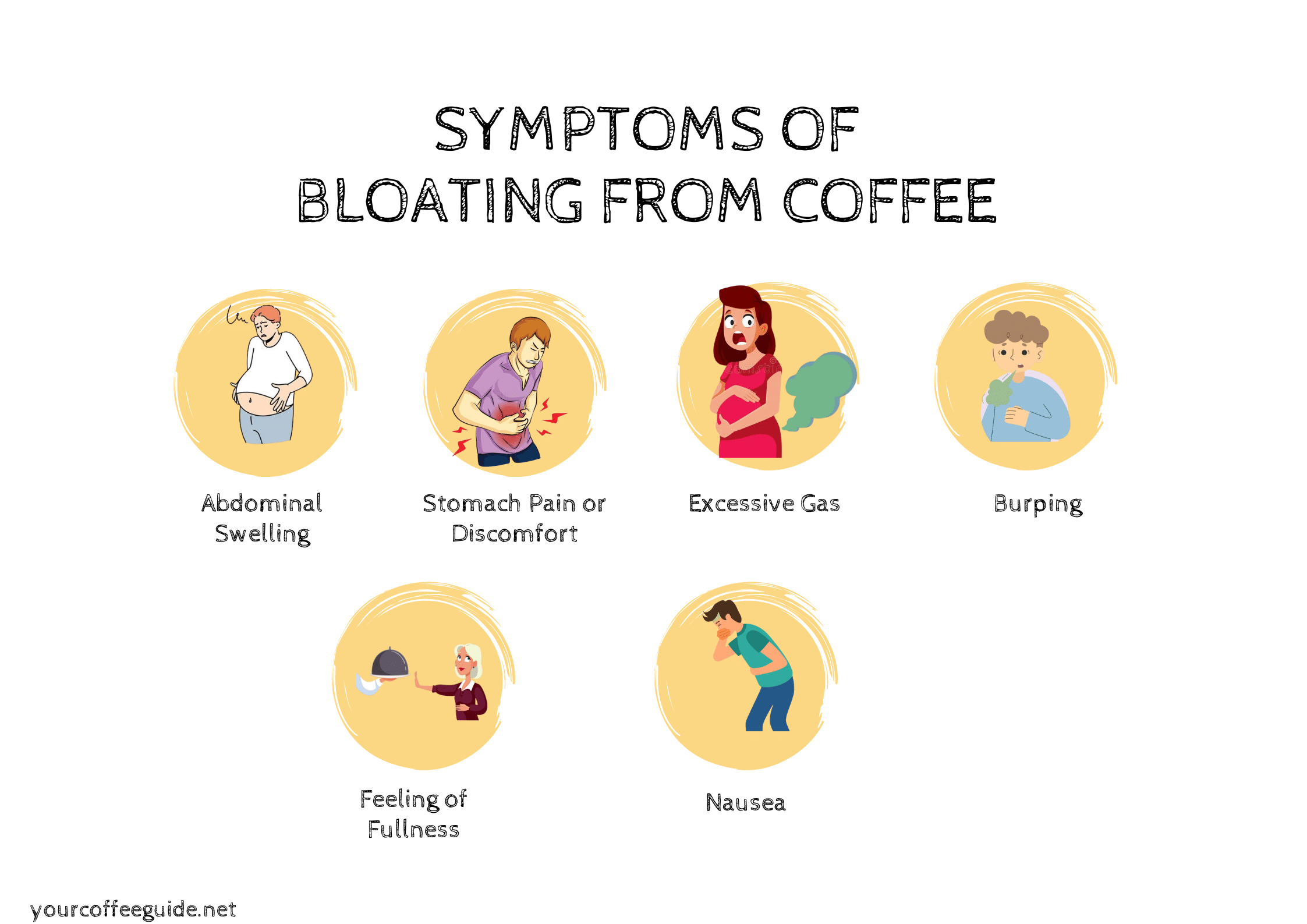
The symptoms associated with bloating from coffee can vary from person to person. However, common symptoms include:
Abdominal Swelling
Your abdomen may appear larger than usual, feeling tight and full.
Excessive Gas
You may pass more gas than usual, either through burping or flatulence.
Stomach Pain or Discomfort
The bloating may be accompanied by a dull ache or sharp pains in the stomach area.
Feeling of Fullness
Even if you haven’t eaten a large meal, you may feel as though your stomach is overly full or distended.
Burping
Increased burping may occur as your body tries to release trapped air from the stomach.
Nausea
In some cases, the bloating may make you feel nauseous or queasy.
If you consistently feel bloated after drinking coffee, it’s worth examining your coffee habit, including how you prepare and consume it.
How to Avoid Bloating from Coffee
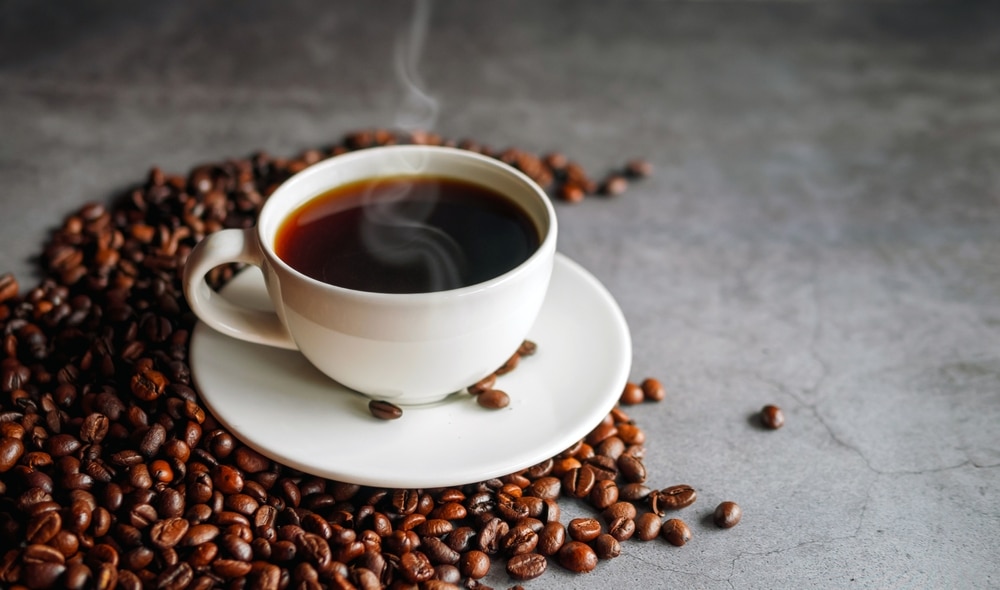
If you’ve identified that your cup of coffee is causing discomfort, don’t worry. There are several ways to continue enjoying your favorite brew while reducing bloating and gas.
Choose Black Coffee
Drinking black coffee without additives such as milk, cream, or sugar can help prevent bloating. If dairy products are a trigger due to lactose intolerance, switching to black coffee or using a plant-based milk alternative may alleviate symptoms. If you’re prone to bloating from coffee, trying your coffee black might be the solution.
Limit Artificial Sweeteners
As mentioned above, artificial sweeteners can cause bloating and gas. Instead of using sweeteners, try a small amount of natural sugar or honey. This can help prevent the excessive gas buildup that comes with digesting sugar substitutes. This change can also benefit your overall gut health.
Add a Small Snack
Drinking coffee on an empty stomach can trigger bloating, as it leads to the production of excessive stomach acids. Eating a small snack, such as a piece of fruit or toast, before your morning cup can help neutralize those acids and prevent irritation to the stomach lining.
Switch to Low-Acidity Coffee
Coffee varies in its acidity levels, and highly acidic coffee can irritate the stomach lining and cause bloating. Opt for low-acid coffee to reduce the likelihood of bloating from coffee. This change can make a significant difference in preventing bloating and keeping your digestive tract happy.
Monitor Your Coffee Intake
Sometimes, it’s not the coffee itself, but how much you’re consuming. Reducing your coffee consumption to one or two cups a day can give your digestive system a break and help in reducing bloating. Moderation is key to maintaining a healthy coffee habit.
Try Probiotic-Rich Foods
Incorporating probiotics into your diet can improve your gut health by balancing the gut bacteria in your system. This can help your body process coffee more effectively, reducing the chance of bloating and gas. Foods like yogurt, kimchi, and sauerkraut are excellent sources of probiotics and can support a healthy digestive system.
Bloating and Coffee Alternatives
If you’ve tried everything and still find yourself thinking, coffee making me bloated, it may be time to consider some alternatives.
Decaffeinated Coffee
If caffeine makes you bloated, switching to decaf might solve the problem. Decaf coffee still provides many of the same health benefits as regular coffee without overstimulating the digestive system.
Herbal Tea
Herbal teas, especially peppermint or ginger tea, can help soothe the digestive system and reduce bloating. These teas are gentler on your stomach than coffee and can still provide a warm, comforting beverage experience.
Matcha
If you still want a bit of a caffeine boost without the bloating, consider matcha, a type of powdered green tea. Matcha contains less caffeine than coffee and is easier on the stomach, making it a great option for those sensitive to coffee’s effects.
Conclusion
While coffee is a morning essential for many, it’s not uncommon to experience bloating or discomfort after drinking it. Factors like gut health, lactose intolerance, drinking coffee on an empty stomach, and sensitivity to caffeine can all contribute to bloating from coffee. But with a few changes to your coffee habit, such as switching to black coffee, reducing coffee consumption, or choosing low-acid coffee, you can still enjoy your favorite brew while avoiding the bloated feeling.
So, the next time you ask, does coffee make you bloated or can drinking coffee give you gas, you’ll know why. By understanding the causes and making small adjustments, you can continue to indulge in coffee’s rich flavor and health benefits without discomfort.

